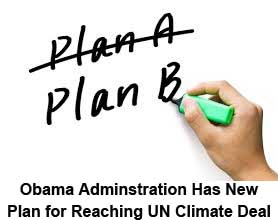In what could be one of the most momentous events in the history of the Green Supply Chain, the Obama administration is preparing to enter a pact with other leading countries to pass laws which will dramatically reduce carbon emissions - but in a way that gets around the need for Senate ratification, albeit with less leverage as a result.
As we have long said here at the GreenSupplyChain.com, the passage of laws in the US that actual put a real price on carbon emissions would usher in dramatic changes in the business and supply chain landscape.
Absent such laws, business are largely free to pursue or not CO2 reduction initiatives, though that statement should be tempered by the fact that mid-sized and smaller companies are being pushed hard by many of their larger customers to reduce CO2 emissions on their own, without any legislation. But even that pressure is largely of a common sense variety that recognizes cost tradeoffs, and doesn't push suppliers too far too fast, lest the large company's own supply chain costs would rise.
But the passage of laws that put a specific price on carbon emissions for companies and/or energy sources, such as a cap and trade scheme or a direct carbon tax, change that dynamic entirely. Then it becomes a very clear dollar and cents game, with companies weighing the cost of emissions versus various mitigation strategies.
In the past week or so, news has leaked from the Obama White House that the administration is working on an accord with other leading countries that would be signed at the 2015 UN Climate summit in Paris - the event that country delegates had designated a couple of years ago for a global agreement of one kind or another relative to emissions.
But it will be an accord with a twist, according to the New Your Times. It will not be a legally binding treaty, which would require approval of two-thirds of the US Senate, support the President would be unlikely to achieve before he leaves office.
Of course, President Clinton ran into the same type of resistance back in 1996 for the Kyoto Treaty, which the US agreed to but which was never even brought to a vote in the Senate.
Rather than a legally binding treaty, the planned accord will be more of a "politically binding " agreement, where it is hoped that the pact would ultimately "name and shame" countries into cutting their emissions. As such, it would not require Senate approval.
Whether countries such as China - the world's largest emitter of CO2 - and India can be shamed into reducing their CO2 totals is a whole other question. Both have said publicly that they are not going to sacrifice economic growth in the name of CO2 reductions.
Another big question under this idea for a pact is how payments to less development countries to help them make adjustments to CO2-lite future would be dealt with, if at all. Larger countries have somewhat vaguely promised billions of dollars of such funding, though some countries are now saying that issue is off the table until and if an emissions agreement is reached in Paris on 2015.
 This approach to a UN deal may be the only viable path to an agreement of any kind, insiders are saying. This approach to a UN deal may be the only viable path to an agreement of any kind, insiders are saying.
"If you want a deal that includes all the major emitters, including the U.S., you cannot realistically pursue a legally binding treaty at this time," Paul Bledsoe, a top climate change official in the Clinton administration who works closely with the Obama White House on international climate change policy, told the New York Times.
The Times also said many Euro countries, generally supportive of a strong legally binding pact, realize the unlikelihood of such a deal getting through the US Senate, and are willing to work with the US on the alternative approach. A non-binding approach might also work well with China and India.
Adding to the complexity, there actually is a modest legally binding treaty on CO2 emissions from all the way back in 1992. Parts of that could be "updated" without Senate approval.
In the end, the deal would look something like this: Countries would be legally required to enact domestic climate change policies, from the 1992 treaty update, but would only voluntarily pledge to specific levels of emissions cuts and to send money to poor countries to help them adapt to climate change. Countries might then be legally obligated to report their progress toward meeting those pledges at meetings held to identify those nations that did not meet their cuts - where the shaming aspect of the deal comes in.
The December UN climate meeting is in Lima, Peru this year, where the outline of a deal is expected to be drawn, for signage in Paris next year.
Meanwhile, poor countries are concerned that a non-legally binding agreement won't guarantee a steady stream of money into their countries, supposedly to be used for things like building dams and solar panel farms, but who knows what in the end.
"Without an international agreement that binds us, it's impossible for us to address the threats of climate change," said Richard Muyungi, a climate negotiator for Tanzania.
It appears more covers will come off this Obama administration proposal in Peru in three months. We'll certainly report back on that then.
What do you think of the Obama administration's climate agreement strategy? Will it work? Let us know your thoughts at the Feedback button below.

TheGreenSupplyChain.com is now Twittering! Follow us at www.twitter.com/greenscm
|